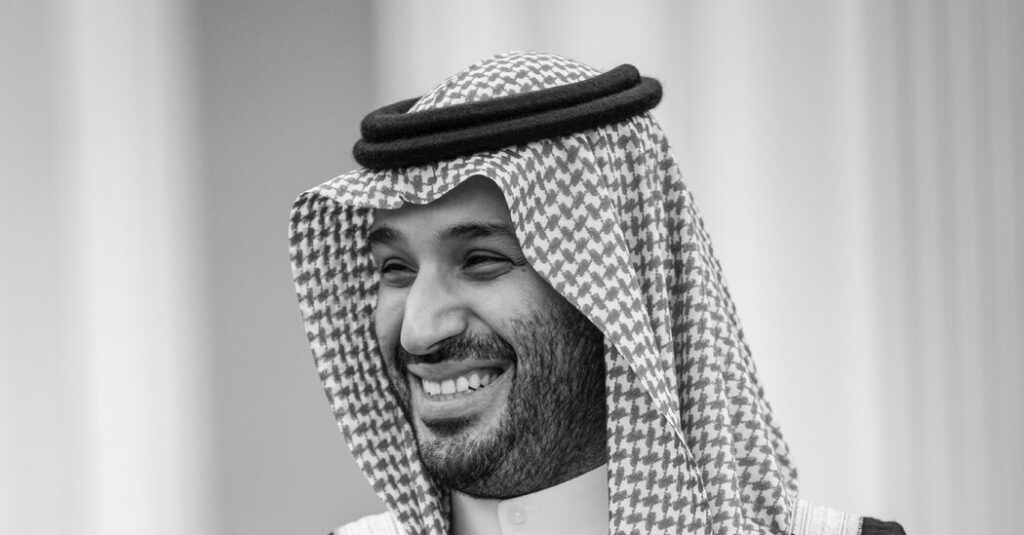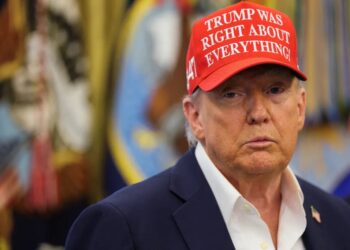It’s an axiom of Hollywood that in any good screenplay, the protagonist must undergo a transformation: reckless to wise, weak to strong, bad to good, sometimes bad to really bad. The seven years since Saudi Arabia’s crown prince and de facto leader, Mohammed bin Salman, first visited America have felt a bit like a screenplay, an expansive and expensive drama filled with glamour and grand visions, intrigue and violence. But was there a transformation?
When he visited in 2018, the crown prince’s brief tenure was known in the United States principally for his authoritarianism and foreign adventurism: the imprisonment of hundreds of Saudi business elite and royal family members in the Riyadh Ritz-Carlton, the escalation of the war against Houthi forces in Yemen that yielded horrific numbers of civilian casualties, the forced resignation of Lebanon’s prime minister, and not long after his visit, the gruesome killing of the exiled Saudi journalist Jamal Khashoggi (the kingdom denies Prince Mohammed was involved).
The human rights picture today is still far from perfect, with political speech effectively curtailed and frequent death sentences issued by an opaque and anachronistic judiciary. But at the same time, Prince Mohammed has made advances once thought unimaginable, including defanging the religious police and eliminating most of the laws that once oppressed the lives of Saudi women.
He also has initiated major changes in other areas, including diversification of the Saudi economy, large-scale investments in renewable energy, the welcoming of foreign tourists of any faith and a head-spinning explosion of culture and popular entertainment that includes concerts, movies and art exhibitions in a country where much of that was only recently illegal.
As Prince Mohammed prepares to meet with President Trump at the White House on Tuesday, he rules over a kingdom that has undergone profound transformation, arguably a product of his own evolution.
In 2018, the crown prince seemed to believe his country, by many measures the most powerful and influential in the Arab world, could shape that region to his will. He was younger and less experienced as a leader, perhaps with an unrealistic sense of his country’s strengths.
His goals and ambitions were not realized. The Houthis weren’t vanquished, or even discouraged, and remain in control of much of Yemen. Humiliating the Lebanese prime minister may have only emboldened Hezbollah, the Shiite force that long dominated the country. Targeting dissidents only further poisoned public opinion against the crown prince among large swaths of the American media, political circles and public.
Those experiences seemed to precipitate a change in Prince Mohammed’s sense of priorities. He came to see the region’s vexing conflicts as unresolvable, except perhaps in generational terms, so he began in earnest to focus his attention inward, prioritizing the economic and social transformation of his own country. Far from getting embroiled in regional conflicts, his goal was to keep them far away from Saudi borders. They served only to threaten what had become the crown prince’s principal effort: the modernization of his kingdom.
That modernization ultimately depends on two things, frustratingly out of anyone’s full control: high oil prices, because what he’s doing is extraordinarily expensive, and an absence of conflict, because investors and tourists most likely won’t be coming from America or Europe or Asia if there are rockets, drones and missiles coming from Yemen or Iran, its primary rival in the region.
In the past year, we have seen how hard both of those things are to maintain. Despite Saudi efforts, oil prices have been trending down. That’s probably OK if you’re an American driver (or an American president), but not great if your priority is to transform an oil-dependent economy, build a manufacturing sector, reform your education system or develop a hospitality industry.
Meanwhile, the conflicts of his region seem to defy de-escalation. In addition to the threats from the Houthis, a civil war rages in Sudan that, in humanitarian terms, is vastly worse than Gaza. The Iranian regime and its ideology remain a tenacious menace to the region — including to Saudi Arabia, which in particular fears attacks on its energy infrastructure — despite 12 days of Israeli and U.S. airstrikes against Iranian military targets. Two years of Israeli airstrikes killed tens of thousands of people in Gaza, destroyed billions of dollars in property, and stoked regional anger that will not easily dissipate. But Hamas is still there, and shows little sign of contrition.
After two years as U.S. ambassador to the kingdom, and after conversations with many Saudis, it is clear to me where the crown prince’s priorities now lie: He would rather focus on attracting international business and investment to the kingdom than become enmeshed in the region’s interminable conflicts. He would rather accept an imperfect Syrian leadership than fuel a civil war that will exacerbate the region’s ills. He would rather reach an uneasy détente with Iran than antagonize it and draw its ire and missiles.
And he would rather end the Gaza war on less than ideal terms than have it continue as a source of inspiration for extremists. The Saudis have not disengaged entirely — they are major providers of humanitarian assistance in the region. But their real focus, Saudis tell me, is on building their own country’s future and not solving the problems of other countries.
In the world of geopolitics, there is no perfect insurance policy, much as Saudi Arabia might like one. But a binding U.S. security guarantee would be a good start. In 2022, there was discussion of a grand deal — essentially a U.S.-Saudi mutual defense treaty in exchange for normalization of relations between Saudi Arabia and Israel. There was always going to be more to it than that, including an economic and energy component and a bolstered U.S.-Saudi military relationship. It would also feature measures to advance the prospects of Palestinian statehood, a condition that Saudi Arabia has said it will insist upon before any normalization with Israel can take place.
But at the heart of the deal for Saudi Arabia was mutual defense: one more way to protect Saudi Arabia’s transformation from a volatile region.
Obviously, the Gaza war made normalization with Israel harder, then took it off the table (and, with it, the defense treaty) for the time being. But treaty or not, Prince Mohammed won’t stop looking for ways to safeguard his country’s security and its transition away from oil, and this is likely to be the focus of his meetings in Washington this week. Press reports suggest that something short of a treaty, like a defense agreement that bolsters the U.S.-Saudi military partnership but doesn’t need U.S. Senate ratification, is likely to be discussed.
The crown prince will also likely want to reinforce Saudi Arabia’s role as a leading player — globally, not just regionally — in emerging technology and artificial intelligence, a key to the successful diversification of its economy. That means he will probably seek an agreement ensuring Saudi access to the most advanced U.S. chips. And because part of the Saudis’ plans for a post-oil future involves civil nuclear power, Prince Mohammed will probably ask Trump to support those ambitions as well.
It’s true that people can never erase their pasts. But the world will soon see Prince Mohammed at a White House dinner — for many, the ultimate emblem of diplomatic acceptance — and that was something almost unimaginable even seven years ago.
Michael Ratney served for over three decades as a U.S. diplomat, most recently as ambassador to the Kingdom of Saudi Arabia. He is currently senior adviser at the Center for Strategic and International Studies.
The Times is committed to publishing a diversity of letters to the editor. We’d like to hear what you think about this or any of our articles. Here are some tips. And here’s our email: [email protected].
Follow the New York Times Opinion section on Facebook, Instagram, TikTok, Bluesky, WhatsApp and Threads.
The post Saudi Leader Looking Inward as He Comes to Washington appeared first on New York Times.




